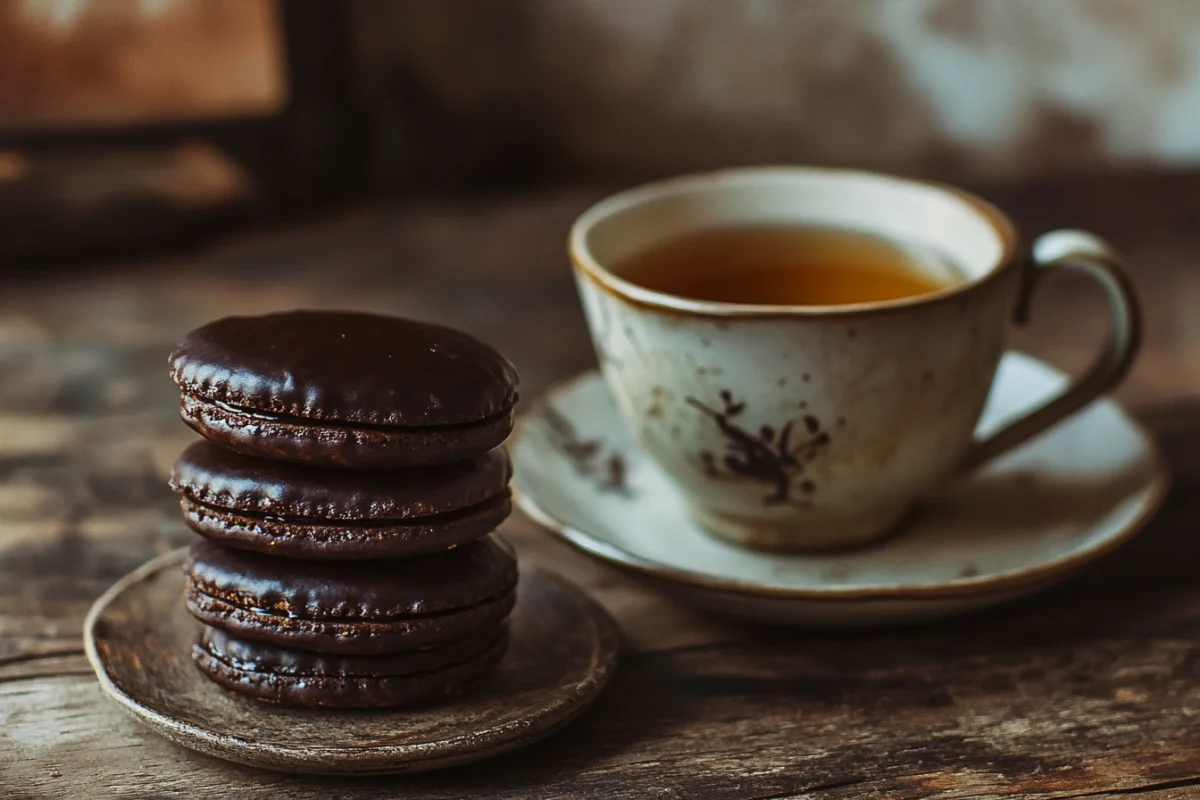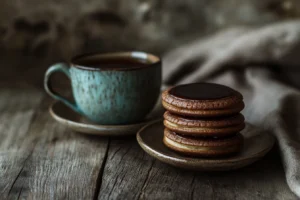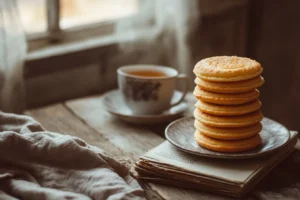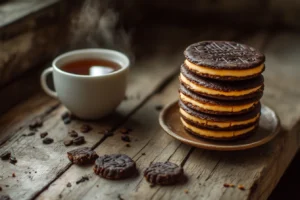This article explores the intriguing question of what legally is a Jaffa Cake. We delve into its classification, discussing its status as a cake, biscuit, or something else entirely.
The Great Jaffa Cake Debate: What Legally is a Jaffa Cake?
The Jaffa Cake has long sparked debate. Many wonder: is it a cake or a biscuit? This question isn’t just for fun; it has legal and tax implications. This article aims to explore, what legally is a Jaffa Cake. We will examine all the factors that contribute to this peculiar classification. Additionally, we will explore its history and cultural impact. Moreover, we will consider how its classification impacts both consumers and manufacturers.
Read more about : Chocolate Pound Cake Recipe
Understanding the Key Differences: Cake Versus Biscuit
To understand what legally is a Jaffa Cake, we must first look at the differences between a cake and a biscuit. Cakes usually have a soft, sponge-like texture. They often become hard when stale. Biscuits, on the other hand, are generally crisp and tend to soften when stale. These contrasting characteristics form the basis of many arguments. However, the Jaffa Cake has a unique nature. Therefore, it doesn’t fit neatly into either category. Additionally, the ingredients and manufacturing process also play vital roles. Specifically, the behavior of the two when stale is a critical difference.
The Ingredient Breakdown: A Closer Look
The ingredients of a Jaffa Cake are crucial in determining its legal status. It has a sponge base, a layer of orange flavored jelly, and a coating of chocolate. Indeed, this combination is quite unique. The sponge base suggests it might be a cake. However, the presence of a biscuit-like base confuses things. Furthermore, the chocolate coating further adds to its complexity. Therefore, these elements need careful consideration. Additionally, we will examine each layer separately, assessing its contribution.
The Production Process: How It’s Made
The method by which Jaffa Cakes are produced is as important as the ingredients. The process typically involves baking a small sponge base. Next, a layer of orange jelly is added. Finally, it is coated in chocolate. This is very different from the way cakes are made, where all ingredients are mixed first. This process resembles biscuit production. Thus, this adds another layer to the what legally is a Jaffa Cake puzzle. Accordingly, the sequence of steps plays a significant role.
The Legal Battles: Case Studies and Rulings
The question “what legally is a Jaffa Cake” has been the subject of many legal cases. In the UK, it even went to a value-added tax (VAT) tribunal. The arguments centered on whether it should be considered a cake or a biscuit for tax purposes. Specifically, cakes are not taxed, while biscuits are. Consequently, this had a large impact on the manufacturer. Therefore, the outcome had significant financial implications.
The UK VAT Tribunal Ruling
The most famous case in relation to what legally is a Jaffa Cake is the UK VAT tribunal. McVitie’s, the producer, argued it was a cake. They pointed to its sponge base and cake-like texture. However, the tax authorities argued it was a biscuit. Eventually, the tribunal ruled that it was indeed a cake. Specifically, they considered the sponge, hardening when stale and the eating experience. Therefore, they deemed it a cake for tax purposes. Moreover, the tribunal’s reasoning is worth further analysis.
Precedent and Implications for Similar Products
This ruling had significant implications. It set a precedent for similar products. Thus, other items might be classified based on similar parameters. This showed that, what legally is a Jaffa Cake is not easily resolved, and the ruling was quite impactful. Subsequently, manufacturers of such products paid close attention. Furthermore, it established a legal framework. Indeed, it had a wider effect on the food industry.
Exploring the Defining Features: Why It’s a Cake
Despite the debate, there are strong arguments to support the cake categorization of the Jaffa Cake. The sponge base is key to its texture and behavior when stale. In fact, it becomes hard when left out, just like a cake. Additionally, it’s normally served with cakes rather than with biscuits. Therefore, many would agree that its classification as a cake makes sense. Specifically, its common pairings and consumption patterns are quite telling.
The Sponge Base: A Key Identifier
The sponge base is perhaps the most defining characteristic of a Jaffa Cake. This is basically what separates it from a biscuit. The sponge structure is very airy and light. Consequently, this leads to a different eating experience. Thus, the sponge base is a strong indicator of its cake classification. Undoubtedly, its texture and behavior align with those of a traditional cake. Moreover, its composition is similar to that of a small cake.
Textural Characteristics When Stale
Another important aspect is how a Jaffa Cake behaves when it goes stale. Unlike biscuits, which go soft when stale, the Jaffa Cake’s sponge base becomes hard. Specifically, this is a clear trait of a cake. Accordingly, this behavior has been a significant point in the legal debates. Therefore, it further strengthens the argument for its cake status. Moreover, this behavior is consistent and easily observable.
Consumption Patterns: How People Eat Them
Generally, Jaffa Cakes are consumed as a cake, rather than a biscuit. They are commonly paired with tea or coffee. This is a common consumption pattern for a cake. Therefore, the way people eat them also plays a part. Ultimately, how consumers perceive the product is also relevant. Additionally, it is usually served alongside other cakes.
What Legally is a Jaffa Cake? The Final Verdict
After a thorough examination, it’s clear that what legally is a Jaffa Cake is not a simple question. The various arguments and legal decisions highlight its ambiguous nature. Nevertheless, the prevailing legal classification in several regions is that of a cake. Consequently, it’s usually treated as such for tax purposes. However, the debate is not entirely settled. Indeed, different opinions still exist.
The Legal Classification Across Different Regions
While the UK VAT tribunal decision is widely known, other regions may have different opinions. However, the principles applied in the UK are often used as a reference. Therefore, the ruling has a broad effect. The idea that it’s more like a cake than a biscuit is widely accepted. Thus, even with some differences, the consensus is to classify it as a cake. Furthermore, many countries adopt similar approaches.
Implications for Consumer Perception
The debate around what legally is a Jaffa Cake has certainly influenced how consumers see the product. Many view it as a treat that sits somewhere between a cake and a biscuit. Furthermore, this unique position has contributed to its appeal. Altogether, the debate has made it a well-known and iconic product. Specifically, consumers often find the debate intriguing.
The Unique Appeal of Jaffa Cakes
The Jaffa Cake’s ambiguous nature has contributed to its unique appeal. Its distinct taste and texture make it a popular treat. Indeed, it is loved by people of all ages. The debate about its classification further adds to its charm. Undoubtedly, it has become a classic snack. Moreover, this creates brand recognition and engagement.
A Treat Unlike Any Other
The Jaffa Cake’s combination of chocolate, orange jelly, and sponge base is unique. Another similar snack does not exist. This uniqueness makes it a popular choice. Specifically, it provides an experience unlike any other. Consequently, this is a significant part of its attraction. Additionally, this distinct flavor profile distinguishes it.
A Timeless Classic
The Jaffa Cake has been a staple in many households for generations. Its characteristic flavor and texture have remained consistent. Furthermore, the debate surrounding its status has added to its allure. Thus, it is seen as a classic that transcends generations. It is considered a timeless treat. Moreover, its familiarity provides comfort and nostalgia.
The Cultural Significance
In some cultures, the Jaffa Cake is more than just a snack. It has a strong cultural significance. Indeed, it is often associated with fond memories. Moreover, its inclusion in social events makes it an important part of everyday life. Accordingly, it holds a special place in the hearts of many. Furthermore, it becomes part of cultural identity.
Expanding the Discussion: Beyond Legalities
While what legally is a Jaffa Cake focuses on legal classification, it is also worth exploring consumer attitudes and preferences. This reveals even more interesting insights. Specifically, marketing also plays a role. Additionally, the role of the manufacturer needs to be considered.
Consumer Perceptions and Preferences
Consumer perceptions often align with the legal classification. However, many see it as somewhere between cake and biscuit. Furthermore, this mixed perception adds to the product’s charm. Consumer preferences also affect sales, marketing strategies, and overall market approach.
Marketing and Branding
The branding of Jaffa Cakes often emphasizes their unique status. The marketing often highlights its quirky nature. Indeed, this makes it a topic of conversation. Accordingly, this is an important element in the product’s success. Thus, their marketing campaign plays an important role.
The Role of the Manufacturer
The manufacturer is crucial in the what legally is a Jaffa Cake debate. McVitie’s have defended its cake status. They have consistently maintained that their product is a cake. Moreover, they must adhere to labeling requirements. Therefore, they play an important part in this debate.
Frequently Asked Questions (FAQs)
Is a Jaffa Cake considered a cake or a biscuit?
Legally, a Jaffa Cake is generally considered a cake in many regions, especially in the UK, due to its sponge base that hardens when stale, similar to a cake. However, it often sparks debate due to its biscuit-like appearance and size.
Why did the UK VAT tribunal classify Jaffa Cakes as cakes?
The UK VAT tribunal classified Jaffa Cakes as cakes because of their sponge base and how they harden when stale. The key factor was that cakes become hard when stale, whereas biscuits soften. Therefore, this behavior aligns with cakes and not with biscuits.
What are the key ingredients of a Jaffa Cake?
The key ingredients of a Jaffa Cake are a light sponge base, a layer of orange flavored jelly, and a coating of dark chocolate. Furthermore, these ingredients create its distinct taste and texture.
Does the classification of a Jaffa Cake affect its tax status?
Yes, the classification of a Jaffa Cake does affect its tax status. In the UK, cakes are not subject to VAT, while biscuits are. Consequently, classifying Jaffa Cakes as cakes meant they were exempt from VAT.
Conclusion: Settling the Jaffa Cake Question?
In conclusion, the question of what legally is a Jaffa Cake is complex. It involves careful analysis of ingredients, production processes, and legal decisions. Although there is much debate, the product is often treated as a cake. However, its unique nature is what makes it so popular and beloved. Therefore, understanding its legal classification is important. Ultimately, the debate may never truly end. Additionally, its quirky classification adds to its mystique.
The Lingering Debate and Consumer Choice
The debate around what legally is a Jaffa Cake will probably continue. Nevertheless, consumers will continue to enjoy this treat, regardless of its exact classification. Its uniqueness remains, making it an enduring classic. Explicitly, whether it is cake or biscuit will likely remain a topic of discussion. Furthermore, this continuous debate adds to its intrigue.
Celebrating the Unique Nature
The Jaffa Cake, indeed, stands apart. It is not entirely a cake or a biscuit. Specifically, this is part of its charm. Thus, its unique character is part of its enduring appeal. It truly is a one-of-a-kind treat. Moreover, its popularity is testament to its uniqueness.
Final Thoughts on What Legally is a Jaffa Cake
Afterward, exploring the question what legally is a Jaffa Cake reveals a fascinating intersection of food, law, and culture. Despite legal decisions, the snack’s ambiguous nature remains. Consequently, the debate may continue for many years. Finally, the enduring popularity of the treat shows that the legal definition may not matter to most. Therefore, it is the consumption and enjoyment that is most relevant.
Explore more about : Where Did The Cookie Croissant Start?




